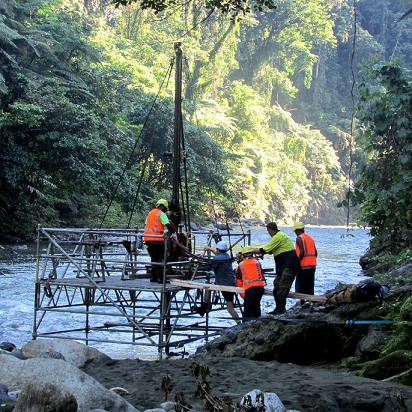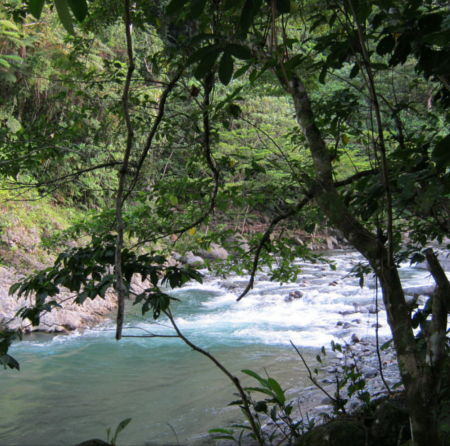Key agreements signed for Tina River Hydropower Project
The World Bank Group has today welcomed the signing of a series of key agreements which will help deliver cheaper and more reliable, renewable energy to Solomon Islands through the Tina River Hydropower Project.
People in Solomon Islands pay among the highest prices in the world for electricity, placing huge strains on families and businesses. The Tina River Hydropower Project aims to increase the amount of renewable energy in the Honiara national grid by nearly 70 percent while reducing reliance on expensive diesel power.
The project will also pave the way for the country to exceed its 2025 greenhouse gas emissions reduction target by two and a half times.
The five agreements signed today are the culmination of over 10 years of preparatory work and three years of negotiations between the Solomon Islands Government, including the state-owned power utility Solomon Power and the private developers of the project, Korea Water Resources Corporation (K-water) and Hyundai Engineering Corporation (HEC). The International Finance Corporation (IFC), a member of the World Bank Group, is transaction adviser to the government of Solomon Islands.
Tina River Hydropower Development Project is Solomon Island’s first large-scale infrastructure project to be developed as a public-private partnership in Solomon Islands and was designed to help lower electricity prices for consumers.
Since it was first considered by the Solomon Islands Government in 2006, the World Bank Group has supported the Tina River Hydropower Project, including through IFC’s transaction advisory support during project preparation and commercial negotiations. The Multilateral Investment Guarantee Agency, also a member of the World Bank Group, is expected to provide equity political risk insurance cover to the sponsors.
“Today’s signing represents the culmination of considerable work by many parties who have supported the Solomon Islands Government in preparing this significant project”, said Solomon Islands Minister for Finance and Treasury, the Hon. Manasseh Sogavare.
“This is an important day in the history of renewable energy in the country and we look forward to the economic and social benefits Tina River Hydropower Project will bring to the people of Solomon Islands.”
“Since this project was first proposed, all parties have remained focused on delivering cheaper and more reliable power to Solomon Islanders through renewable energy,” said Guido Rurangwa, the World Bank’s Country Representative in Solomon Islands.
“We congratulate the Solomon Islands Government and Solomon Power on reaching this important milestone that will ultimately improve the lives of thousands of Solomon Islands families, businesses and the country as a whole.”
“This project will lead to a shift from nearly 100 percent diesel to majority renewable energy for the people of Solomon Islands,” said Milissa Day, IFC’s Representative for Solomon Islands.
“This dramatic transition from diesel to renewable energy and from public to private investment shows what is possible for small island nations seeking lower energy costs and with a commitment to renewable energy, which is vital for this region as it adapts to the challenges of climate change.”
The agreements signed today include the Power Purchase Agreement between Solomon Power and Tina Hydropower Limited, a partnership between K-water and HEC, and the Government Guarantee Agreement and Implementation Agreement between the Solomon Islands Government and Tina Hydropower Limited.
Agreements were also signed between the Solomon Islands Government and the World Bank for US$33.6 million in support to the project from the International Development Association, the World Bank’s fund for the world’s most in need countries.
The Australian Government is providing an additional US$12.7 million in project funding as part of the Australia Pacific Islands Partnership (APIP). Australia will support the construction of the access road to the project site and technical assistance for the Solomon Islands Government to manage project implementation.
Over the past 10 years, the Australian Government has provided AU$10 million to support project preparations through the APIP and Pacific Regional Infrastructure Facility Trust Funds. Other financing sources that supported the project preparation include the Global Infrastructure Facility and the Energy Sector Management Assistance Program.
In addition to the World Bank Group and Australian Government, financial support has been confirmed by the Abu Dhabi Fund for Development/International Renewable Energy Agency, the Green Climate Fund, and the Economic Development Cooperation Fund of Korea.
IFC’s work in Solomon Islands is guided by the Pacific Partnership. Australia, New Zealand, and IFC are working together through the Pacific Partnership to stimulate private sector investment and reduce poverty in the Pacific.
As well as the APIP, the project development has been supported by The Infrastructure Development Collaboration Partnership Fund—funded by Austria, the Netherlands, Sweden and the UK—which focuses on facilitating private investment in infrastructure projects.


